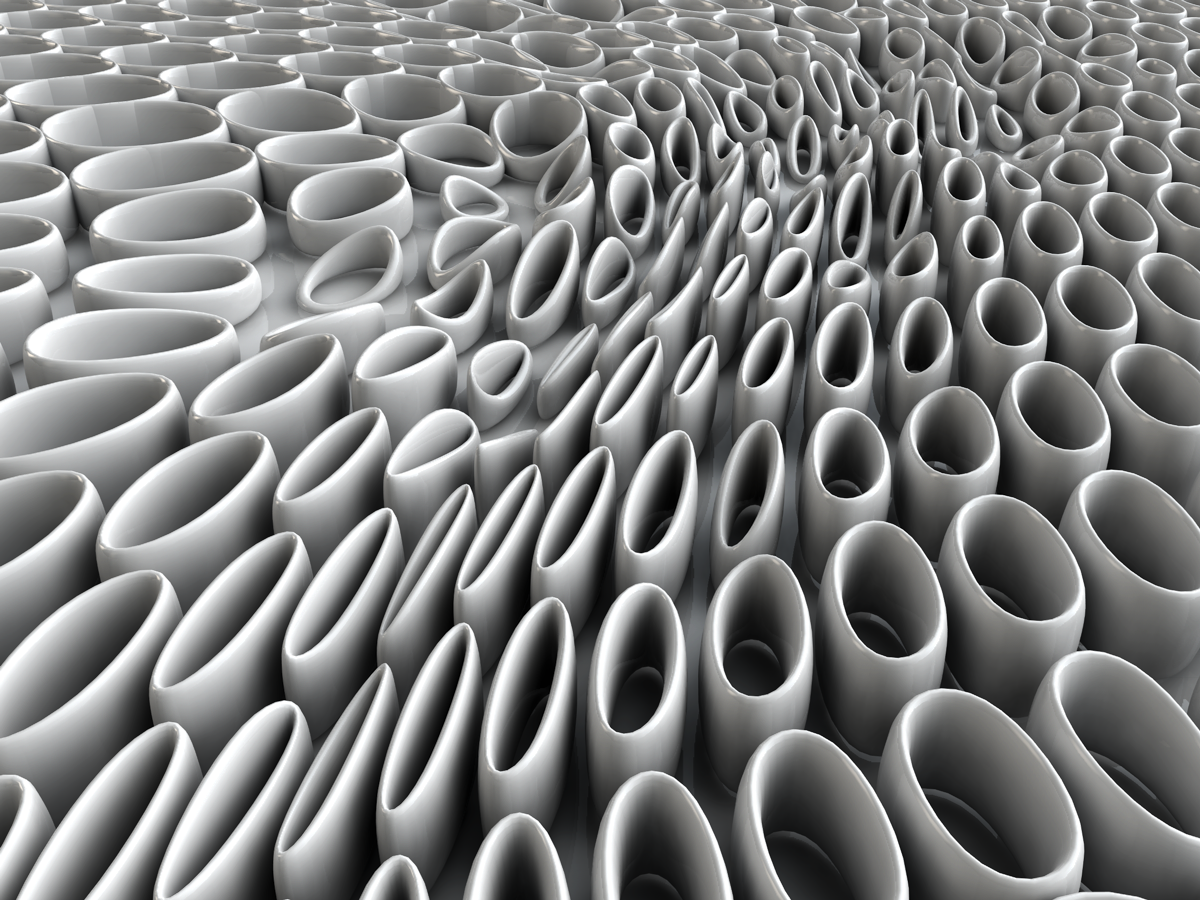cas/taxonomy/field.php (field)

Parametric Urbanism
New ways of modeling the physical shape of cities allows us to shape-shift at the touch of a keystroke. Can this ability to generate a multiplicity of possible future urbanities help make better cities?
Parametric approaches to urban design are based on creating responsive models of urban contexts that are programmed to change form according to how inputs are varied. Rather than the architect creating a final product, they instead create a space of possibilities (Phase Space) that is activated according to how various flow variables - economic, environmental, or social, are tweaked. This architectural form-making approachholds similarities to complex systems in terms of how entities are framed: less as objects in and of themselves, and more as responsive, adaptive agents, activated by differential inputs.
More Coming Soon! In the meantime, check out the tutorial under the "Resources" section.
Relates to topology;
Relates to variations;
Relates to differentials
Back to Complexity & Urbanism
Back to Navigating Complexity
Photo Credit and Caption: FEDERICO BORELLO
Cite this page:
Wohl, S. (2022, 13 June). Parametric Urbanism. Retrieved from https://kapalicarsi.wittmeyer.io/taxonomy/parametric-urbanism
Parametric Urbanism was updated June 13th, 2022.
Nothing over here yet
This is the feed, a series of related links and resources. Add a link to the feed →
This is a list of People that Parametric Urbanism is related to.
On Growth and Form
Caramelization half and half robust kopi-luwak, brewed, foam affogato grounds extraction plunger pot, bar single shot froth eu shop latte et, chicory, steamed seasonal grounds dark organic. Learn more →This is a list of Terms that Parametric Urbanism is related to.
For a system to adapt, it needs to have variables to adjust.
See also: Requisite Variety
Learn more →Phase space is an abstract concept that refers to all possible behaviors available to an agent within a complex system.
Related to {{degrees-of-freedom}}. Learn more →The idea that systems can have more than one stable state.
Early versions of systems theory assumed that systems could be 'optimized' to a single condition. CAS analysis assumes that more than one system state can satisfy optimizing criteria, and so the system is able to gravitate to multiple equilibria.
Learn more →Agents in a Complex System are guided by neighboring agents - nonetheless leading to global order.
More coming soon!
Learn more →This is a list of Urban Fields that Parametric Urbanism is related to.
This is a list of Key Concepts that Parametric Urbanism is related to.
Complex systems are composed of agents governed by simple input/output rules that determine their behaviors.
One of the intriguing characteristics of complex systems is that highly sophisticated emergent phenomena can be generated by seemingly simple agents. These agents follow very simple rules - with dramatic results.
Learn more →Navigating Complexity © 2015-2025 Sharon Wohl, all rights reserved. Developed by Sean Wittmeyer
Sign In (SSO) | Sign In
Related (this page): Driving Flows (25), Bottom-up Agents (22), Adaptive Capacity (21), Variables (58), Rules (213), Networks (75), Multiple Equilibria (79), Local Interactions (89), Degrees of Freedom (78),
Section: fields
Non-Linearity Related (same section): Urban Modeling (11, fields), Resilient Urbanism (14, fields), Relational Geography (19, fields), Landscape Urbanism (15, fields), Evolutionary Geography (12, fields), Communicative Planning (18, fields), Assemblage Geography (20, fields), Related (all): Tipping Points (218, concepts), Path Dependency (93, concepts), Far From Equilibrium (212, concepts),
Nested Orders Related (same section): Urban Modeling (11, fields), Urban Informalities (16, fields), Resilient Urbanism (14, fields), Related (all): Self-Organized Criticality (64, concepts), Scale-Free (217, concepts), Power Laws (66, concepts),
Emergence Related (same section): Urban Modeling (11, fields), Urban Informalities (16, fields), Urban Datascapes (28, fields), Incremental Urbanism (13, fields), Evolutionary Geography (12, fields), Communicative Planning (18, fields), Assemblage Geography (20, fields), Related (all): Self-Organization (214, concepts), Fitness (59, concepts), Attractor States (72, concepts),
Driving Flows Related (same section): Urban Datascapes (28, fields), Tactical Urbanism (17, fields), Relational Geography (19, fields), Parametric Urbanism (10, fields), Landscape Urbanism (15, fields), Evolutionary Geography (12, fields), Communicative Planning (18, fields), Assemblage Geography (20, fields), Related (all): Open / Dissipative (84, concepts), Networks (75, concepts), Information (73, concepts),
Bottom-up Agents Related (same section): Urban Modeling (11, fields), Urban Informalities (16, fields), Resilient Urbanism (14, fields), Parametric Urbanism (10, fields), Incremental Urbanism (13, fields), Evolutionary Geography (12, fields), Communicative Planning (18, fields), Related (all): Rules (213, concepts), Iterations (56, concepts),
Adaptive Capacity Related (same section): Urban Modeling (11, fields), Urban Informalities (16, fields), Tactical Urbanism (17, fields), Parametric Urbanism (10, fields), Landscape Urbanism (15, fields), Incremental Urbanism (13, fields), Evolutionary Geography (12, fields), Related (all): Feedback (88, concepts), Degrees of Freedom (78, concepts),
